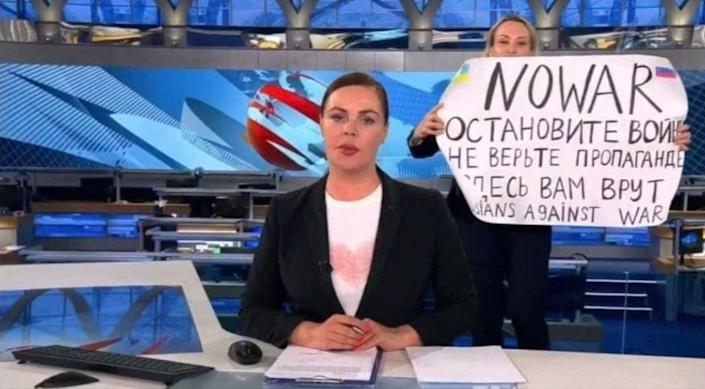
The bravery of the Russian people continues to inspire me.
You read that right. In case there is any confusion, I mean the Russian people. Not the oligarchs currently waging an imperial war in Ukraine. Rather, I mean folks like Maria Ovsiannikova, who last night staged a one-woman protest against the war. During a live broadcast on Russian state TV, she stormed the studio while holding up a sign reading “Stop the war. Don’t believe the propaganda. They lie to you here.” This was followed by release of a pre-recorded message (in Russian) which has been translated to say in part “what is going on in Ukraine is a crime.” This afternoon, news broke that she had been found guilty of flouting protest regulation and was fined 30,000 roubles ($280.)
Since Vladimir Putin, the autocrat who for two decades has governed Russia with an ever-rightening grip, invaded the sovereign nation of Ukraine last month, the Russian people have shown the world that this is his fight, not theirs. At least 8000 protestors have been arrested in dozens of Russian cities, from Saint Petersburg in the west to Khabarovsk in the Russian Far East.
These everyday citizens are standing up to Putin’s authoritarian regime at great risk to their own life and liberty. In doing so, they serve as a reminder that the working classes of Russia — indeed, the Russian people in general — are not our enemies. The oligarchs who got us into this mess are.
Putin’s invasion of Ukraine was rightly met with international condemnation and historic sanctions. This was right and just. The international community could not simply sit back and let a cruel dictator upend a global order which has served us admirably for 75 years. Ukraine, a historically oppressed nation, deserves every ounce of our solidarity.
And yet. While I agree that something had to be done, my heart breaks for the Russian people who are suffering as a result of these sanctions. Russian YouTuber Niki Proshin this week revisited a grocery store he had filmed a video in four months previous, and the inflation on everyday basics was shocking. Eggs have gone up 10 percent. Milk is up 45 percent. Fish is up 63 percent. This rise in prices tracks with reporting done by international media, including at the BBC, the Washington Post, and Al-Jazeera.
Meanwhile, in the west, anti-Russian sentiment is on the rise. “Across Europe, people who have no involvement with the war are being targeted and removed from positions,” Aleksandra Lewicki, a sociologist at the University of Sussex, told the Washington Post earlier this month. “There’s a sense of a clear enemy… It’s Russians, from all walks of life, who are being targeted by racist hate crimes and derogatory comments.” Russians living in the UK have reported being the victims of online harassment and even death threats.
We should all be horrified and deeply shamed by this. It should go without saying that everyday Russians are not our enemies. They are our fellow workers of the world, and whether they fled Russia before the war or are stuck there now, they are the victims of an oppressive regime.
Putin has run an oligarchy for twenty years, with those who managed the industry in the waning years of the USSR becoming wealthy capitalists in control of the means of production post-1991. These people have tightened their grip over Russian industry and politics in the past two decades. Putin’s neo-imperialist agenda aims at enriching and entrenching the power and interests of these people, not the Russian working class.
This is why he has clamped down on their freedoms. It is also why many of these wealthy elites have made places like London their playgrounds, exerting control over western media, sport, business, and high finance. Here in the west, they can enjoy the freedoms they denied the proletariat at home while simultaneously furthering Russia’s interests abroad by entrenching it in the local and global economies of their host nations.
Workaday Russians can only wish to be so fortunate. They know it, too. That’s why Russian soldiers in Ukraine are performing so poorly — for many, their morale is low as they fight what they know is an unjust war.
Ukraine, also a previous SSR, has had its own problems. Zelensky rode an anti-oligarch, anti-nationalist wave into office — though his Servant of the People Party is mostly libertarian and has done little to address the material needs of his people. Zelensky himself was not a champion of the working class. As recently as last October, Al Jazeera was reporting that his reelection chances were hurt by revelations in the Pandora Papers that he had millions invested in offshore businesses.
Meanwhile, working class Ukrainian men are left to valiantly fight for their homeland — and, to his credit, Zelensky bravely leads them — but Ukrainian oligarchs fled the nation ahead of the invasion. Other wealthy and famous men, like Maksim Chmerkovskiy, have reportedly used foreign passports and other means to escape the fighting. While I’m loathed to blame anyone for doing whatever necessary to escape a war zone — Chmerkovskiy is only human, like you or me — it is worth noting that the vast majority of Ukrainians will not have such recourse or privilege. Even here in the west, it is the working class that bears the burden of war. They are the ones hurt by rising gas prices. It is the working class who have lost jobs to a globalized economy which was meant to usher in a new world order of interdependency which would in turn ensure world peace as never before. And, God forbid, should this conflict escalate, it is working class kids from the hills of Appalachia and the valleys of Wales who would be sent to fight — not the scions of the west’s own oligarchs who will no doubt remain ensconced in their palaces in Manhattan and Mayfair.
The working class in both Russia and Ukraine are already paying for this war with their blood. As workers, our solidarity naturally goes to the people of Ukraine fighting for their right to self-determination. It should also be with the working class Russians, who never asked for this war and who do not stand to benefit, not even a little bit.




